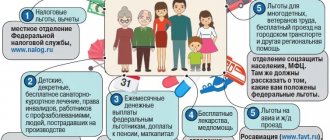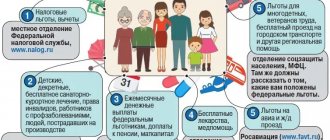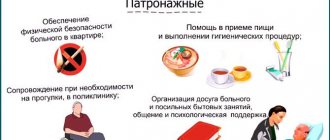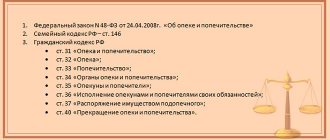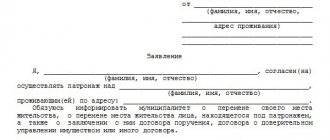Home / Family law / Adoption and guardianship
Back
Published: 08/16/2018
Reading time: 9 min
0
739
The presence of mental disorders or physical abnormalities often makes a person unable to independently perform even daily household functions. In this case, he cannot do without an assistant. At the legislative level, a set of measures is provided to protect the rights and interests of this category of citizens.
- Types of guardianship for disabled people, the difference between guardianship and trusteeship Who can be a guardian?
- Who is not suitable for the role of guardian?
- Responsibilities of a guardian to the state and the disabled person
- Documentation
- Social benefits
Persons who take care of disabled people are given a number of responsibilities and rights, the implementation of which is monitored by the guardianship and trusteeship authority.
Who can receive disability benefits?
Carers and assistants can look after people with disabilities. Guardians are the legal representatives of citizens with disabilities. They act in the interests of the ward without a power of attorney. The basis for representing the interests of disabled, incapacitated or partially capable persons is the “Act of Appointment...”. The document is issued and certified by the guardianship authority. The appointment of guardianship over incapacitated adults occurs by court decision.
The rights and responsibilities of guardians are determined by Article 15 of the Federal Law of April 24, 2008 No. 480-FZ. Applicants must be of legal age and legal capacity.
Assistants can also care for disabled people (with the exception of group I childhood disabilities). For example, one of the relatives or third parties. The disabled person independently determines the amount of assistance. Assistants are entitled to payments for the entire period of caring for a disabled person (Decree of the President of the Russian Federation of December 26, 2006 No. 145). The benefit is paid even if the assistant lives separately from the ward.
An assistant can be any individual over 14 years of age. The person must be able to work, but not work and not receive a pension or unemployment benefits.
On a note! Incapacity refers to a person's inability to understand the meaning of their own actions and control their actions. Guardians provide care for incapacitated persons.
What is prohibited for guardians and trustees?
Guardians/trustees and patronage assistants of disabled people are prohibited from performing certain actions:
- make transactions with the property of a disabled person under his ward (without the permission of the guardianship and trusteeship authority);
- prevent the disabled person's ward from communicating with his relatives: mother, father, child, as well as friends and other loved ones.
Elena Stanislavovna
Guardianship and trusteeship lawyer, 26 years of experience
Ask a Question
Often, acquaintances and relatives of a sick person begin to formalize guardianship, expecting to receive an inheritance after the death of the ward. However, according to current legislation, guardians have the right to claim inheritance after the death of the ward (except for close relatives who are legal heirs). A guardian can claim an inheritance under a will only if the will was drawn up before the court decision on deprivation of legal capacity - in his right mind.
As you can see, the procedure for registering guardianship is not too complicated, if there are reasons for it - a mental state in which a person is not able to independently take care of himself, act consciously, and make informed and reasonable decisions. However, the consequence of registration of guardianship will be a number of additional responsibilities and extremely little government support.
In the vast majority of cases, the guardian or trustee takes care of a helpless loved one completely unselfishly.
Benefit rate
When caring for a disabled child under 18 years of age, parents are paid 10,000 rubles. If a regional coefficient is in effect in the region, then the amount of assistance can increase to 20,000 (Letter of the Ministry of Labor of the Russian Federation dated 06/09/2003 No. 1199-16). Guardians of disabled adults receive an additional payment of 1,200 rubles.
Guardians are also entitled to the following benefits:
- Reimbursement of costs for housing and communal services – 50%.
- Once a year, vacation in a sanatorium with your ward.
- Discount on payment of land tax.
- Exemption from property tax (Article 407 of the Tax Code of the Russian Federation).
- Exemption from payment of transport tax (cars up to 200 hp).
Group I disabled people are also paid a disability pension. The incapacitated person's money is usually managed by a guardian.
Non-working able-bodied persons are paid 1200 rubles monthly. Residents of the Far North receive payments taking into account the regional coefficient (1.15-2). The money is accrued along with the pension of the disabled citizen.
Subjects of the Russian Federation may provide additional types of payments to families of disabled people. For example, clause 1.4 of the Moscow PP dated 12/16/2020 No. 2260-PP.
Registration procedure
The allowance for caring for a disabled person of group 1 is calculated based on the submitted application.
The funds will be transferred along with the ward’s pension, so it will be assigned by the Russian Pension Fund in the same division where the person’s case is registered. Taking into account the specifics of such payments, it turns out that the legislator reserved the right for an incapacitated citizen to independently determine the amount of remuneration. Thus, on the one hand, a person can evaluate the work of the caregiver, and on the other hand, a violation of the rights of the caregiver may occur.
Which authorities should I contact?
To apply for compensation for caring for a group 1 disabled person, you must visit the Pension Fund of Russia.
An application for payments may be sent in person to a branch of the Russian Federation agency or to a subdivision on the territory of Belarus. Additionally, you can use the services of the Multifunctional Center. On average, the processing time for an application is not 5-7 days, but in some situations the decision is made up to 10 days. When using electronic registration, the response period does not change. The benefit is assigned starting from the next month after registration of the application. Each year, the guardian should update the documents and application for compensation payments.
The need is due to the fact that department employees making deductions receive a certificate of the status of people. In other words, the health status of the ward and the availability of new sources of income for the guardian.
List of documents
When applying for benefits, you must attach the following documents for caring for a disabled person of group 1:
- guardian's passport + photocopy;
- applicant's pension certificate + photocopy;
- a certificate from the central bank confirming the absence of an official place of work and receipt of unemployment assistance;
- medical examination indicating the assignment of the ward’s disability group;
- an extract from the Federal Tax Service confirming that the caregiver does not have the status of an individual entrepreneur;
- if supervision is required for a child under 18 years of age, then a certificate of group assignment is required;
- when assistance is provided to an elderly citizen, a medical report from a therapist or supervising doctor is provided;
- work records of both parties;
- certificate of absence of pension accruals to the guardian.
It is noteworthy that a child can take care of an incapacitated person upon reaching the age of 14. However, this will require the written consent of the father and/or mother, as well as the representative.
A minor can supervise a ward only in his free time from the educational process. A certificate from the school confirming full-time education is presented to the Russian Pension Fund.
Read also: Compensation for kindergarten
Rules for drawing up an application
The template for the application was developed and implemented by the Ministry of Labor in Order No. 166n dated April 13, 2016. As a rule, it can be obtained from the Russian Pension Fund branch.
The text must include the following information:
- the name of the department department that is responsible for transferring payments;
- full name of the applicant's form;
- information from the passport;
- residence and registration address;
- information about personal bank account;
- pension certificate number;
- indication of belonging to the country (citizenship);
- email address;
- the date from which supervision of the incapacitated person began;
- in the “employment information” column you must put a dash or enter “not working”;
- indicate the availability of other sources of income, including other benefits;
- note your current education;
- list the attached documents;
- set the date for drawing up the application;
- personally endorse.
Note: in the case when another person acts on behalf of the applicant, it is necessary to present a power of attorney drawn up in a notary’s office.
Order of the Ministry of Labor of the Russian Federation dated April 13, 2016 N 166n “On approval of the Administrative Regulations for the provision by the Pension Fund of the Russian Federation of state services for making compensation payments to non-working able-bodied persons caring for disabled citizens”
Benefits for disabled people of group 1
Benefits for disabled people of the first group:
- Disability pension.
- Payments for disabled children.
- Monthly allowance for a disabled child of group 1.
- Monthly compensation payments for the loss of a breadwinner.
- Compensation payments in connection with increased food prices.
- Special conditions for studying at school.
- Special working conditions for guardians.
On a note! Disability pensions are not provided to children.
The list of additional benefits and social payments depends on the region of residence of the person (disabled person, guardian).
How much pay?
Due to such a great responsibility when receiving guardianship, this citizen has the right not to refuse payment for his services. If his ward has 1 group, then he has the right to count on the following amounts:
- if a person received his disability in childhood, then the amount of payments will be 5,500 rubles ;
- if the disability was acquired in subsequent years, then the amount of compensation for the guardian will be only 1200 rubles .
But when formalizing his obligations, the guardian must take the ward to live with him, or in extreme cases, with the permission of the guardianship authorities, move to live with him. Therefore, he will be able to enjoy some of the benefits of a disabled person:
- receive a discount or compensation for housing and communal services in the amount of 50%;
- arrange free vouchers and travel for one accompanying person to the sanatorium;
- receive housing tax exemption;
- receive discounts when paying transport and land taxes if the vehicle meets the established requirements and is used to transport a disabled person;
- receive labor benefits;
- get 50% discount on a landline phone
- when taxing received income; receive an increased tax deduction of 6,000 rubles
- ride free of charge on public transport as an accompanying person with a disability.
If a disabled person has only the second group, then payments to his guardian will not be assigned. However, he will be able to enjoy some benefits:
- You can receive social services free of charge.
- Travel as an accompanying person on public transport will be free.
- You can get a discount or compensation of 50% for housing and communal services.
- You can get some benefits when getting an education .
These benefits and payments apply to all guardians of disabled people.
But a group is not assigned to children, but rather the presence of a disability is simply determined. Therefore, the amount of payments for such a guardian will be 5,500 rubles until the child becomes an adult. But even after this, the payment will not change, since the same amount is provided for those who have been disabled from an early age.
In addition, guardians of children with disabilities have the right to claim the following benefits:
- to obtain housing or receive subsidies for its purchase;
- 50% discount or compensation on housing and communal services;
- apply for a plot of land for a garden or individual housing construction on a non-gratuitous basis;
- have all other benefits that are provided for guardians of sick people with group 1.
Please note that such payments are only available to non-working persons, and they must be able to work. If you are registered on the stock exchange and receive a corresponding benefit, you are not eligible to claim this payment.
But the ward himself can assign a reward to the person who takes care of him from his other income, for example, from renting an apartment or other property. You can learn more about this from the presented video.
Benefits for disabled people of group 2
Benefits for disabled people of the second group:
- Disability pension.
- Monthly allowance for caring for a disabled person from childhood until the age of 23.
- Survivor benefits.
On a note! Some types of payments for children with disabilities of groups 1 and 2 are repeated.
Separate benefits are provided to single mothers, orphans and large families. More information can be found on the City Administration website.
Guardians of disabled children can apply for a shortened working day (Article 93 of the Labor Code of the Russian Federation).
Sending on business trips, engaging in work at night or on weekends is allowed only with the consent of the employee (Article 259 of the Labor Code of the Russian Federation).
In some cases, an employer does not have the right to terminate an employment contract with an employee who is raising a disabled child (Article 261 of the Labor Code of the Russian Federation).
The guardian is entitled to four paid days per month. The procedure for granting days off was approved by the Russian Federation GD dated October 13, 2014 No. 1048. Payment is made in the amount of average earnings.
Guardians of disabled children can choose the time of annual leave at their own discretion (Article 262.1 of the Labor Code of the Russian Federation). Plus, they are entitled to 14 unpaid days.
Cases of termination of payments
The law provides for cases when the payment of benefits is terminated. These include:
- death of a disabled citizen or person providing care, as well as recognition of them as dead or missing in the prescribed manner;
- termination of care by the person providing care, confirmed by a statement from a disabled citizen and an inspection report from the body paying the pension;
- assigning a pension to the caregiver, regardless of its type and size;
- assignment of unemployment benefits to the caregiver;
- performance of paid work by a disabled citizen or caregiver;
- expiration of the period for which the disabled citizen was assigned disability group I;
- recognition as a group I disabled person since childhood;
- placement of a disabled citizen in a social service organization.
Notification of the occurrence of such situations must be sent to the Pension Fund within 5 days. The application can be submitted in person, through a representative (a power of attorney is required) or using the government services portal.
Benefit for disabled children
How much do disabled children get paid? They are entitled to monthly cash payments in the amount of 2,919.02 rubles. The basis for receiving benefits is the Federal Law of November 24, 1995 No. 181-FZ and the Law of the Russian Federation of May 15, 1991 No. 1244-1.
Note. The amount of EDV is valid from February 1, 2021 (indexation coefficient 1.049%).
Separately, citizens are entitled to one-time payments when adopting children. For example, in Moscow they give 6,023 rubles for the first child, 15,879 for the second.
Disabled people from childhood, groups 1 and 2 are also entitled to a tax deduction. Its size is 12,000 rubles. for parents and 6,000 rub. for guardians (Article 218 of the Tax Code of the Russian Federation).
What does guardianship provide?
Most people with disabilities need outside help. But the types of assistance can vary significantly. For some, it is enough to provide household services - cleaning, cooking, buying groceries, etc. Others, due to illness, require full guardianship. In this case, the guardian represents the interests of the ward in government bodies and carries out financial transactions on his behalf.
It must be taken into account that Russian legislation strictly limits the list of persons in respect of whom guardianship can be assigned. They must meet one of the following requirements:
- Be incapacitated. This means that a person cannot be aware of his own actions and make informed decisions. A person is declared incompetent by a court.
- Be disabled. This term refers to the temporary or permanent inability to perform personal care. In this case, a person may be legally capable.
Disability is the cause of a person's incapacity or inability to work.
Based on these problems, a person may be prescribed:
- Guardianship or trusteeship (in accordance with Article 31 of the Civil Code of the Russian Federation). This is possible only in relation to persons recognized as incompetent or partially capable.
- Patronage (in accordance with Article 41 of the Civil Code of the Russian Federation). This type of assistance is prescribed for disabled people who have not lost their legal capacity, but are incapacitated.
In a foster care situation, disabled people are provided with assistance in everyday life, but they make decisions independently.
Registration of sick leave when caring for a disabled person
A sick leave certificate is issued for the entire period of treatment of the child. However, payment for it is made only for 120 days a year. This may include different treatments and illnesses. Sick leave payment scheme:
- Inpatient treatment – in the amount of average monthly earnings.
- Outpatient treatment - 100% for the first 10 days, 50% for all subsequent days.
When caring for an adult, a different procedure applies. For each disease, a sick leave certificate is issued for 7 days. The maximum period of sick leave during the year is 30 days.
Where to go
To register guardianship, you must contact the guardianship and trusteeship authorities at the applicant’s place of residence.
How to receive cash benefits for caring for a disabled child? To receive social benefits, you need to submit documents to the local Pension Fund. Citizens can also contact the MFC. More information about the procedure for applying for benefits here.
Who can apply for cash payments to care for disabled people? A package of documents to receive benefits must be submitted by a guardian.
Guardianship of a disabled person from the point of view of the law
Guardianship is part of family law and, accordingly, is regulated by the Family Code of the Russian Federation. This law prescribes duties with rights in relation to both the guardian and his ward. In addition, general points on the topic of guardianship and trusteeship are presented in the Civil Code of the Russian Federation.
Experts add the following: if the matter concerns guardianship of a person with group 1 disabilities, it is worth additionally taking into account the norms of the Government of the Russian Federation No. 343 of June 4, 2007 and the provisions of Federal Law No. 48 of April 24, 2008.
Deadline for announcement of the decision
Registration of guardianship takes about 14 days. The guardianship authority is given 10 days to conduct a survey of housing conditions and three days to draw up a report. Usually during this time a conclusion is prepared on the possibility (impossibility) of being a guardian.
Package of documents for guardianship
List of documents for registration of guardianship:
- Application from the applicant.
- Brief autobiography.
- Consent of the ward to receive help from a third party.
- A certificate from the Pension Fund stating that the applicant is not receiving a pension.
- Evidence of non-payment of unemployment benefits.
- Medical report (form No. 164/у).
- Passport of the future guardian.
- Certificate of income from employment for 12 months.
- Consent of all family members to accept someone else's child.
- Marriage registration certificate.
The package of documents depends on who is receiving guardianship (child or adult). Immediately after registration of guardianship, you can apply to the Pension Fund for payment of benefits.
Refusal to register guardianship: reasons and grounds
Citizens who have previously been deprived of parental (guardianship) rights or have a criminal record can receive an unequivocal refusal to assign guardian status. A previously committed crime must be one that is directed against the health or life of people (Article 35 of the Civil Code of the Russian Federation, paragraph 2).
Grounds for refusal may also be:
- Provision by an applicant for the role of guardian of distorted information about himself;
- Presence of health problems (mental disorders, viral and other serious diseases), disability of group 1;
- Abuse of alcohol, narcotic or psychotropic substances;
- Lack of stable income and living space, and if it is available, the housing’s compliance with sanitary standards is taken into account.
If a Russian applying for the status of a guardian has not received approval of his candidacy, he has the right to appeal to the court and challenge the decision made by the OOiP.
Before filing a statement of claim, it would be more correct to contact the management of the body for an explanation of the reasons for the dissatisfaction of the application.
Filing a claim becomes possible within a month and is carried out to the authority at the location of the plaintiff (interested person) or defendant (OOiP).
Additional questions
No. 1. Can 2 or 3 people provide care at the same time?
A guardian or non-working citizen has the right to care for several persons at the same time. In this case, benefit payments are made for each person separately.
No. 2. Where should I go to apply for guardianship?
Interested persons should contact the guardianship authority at their place of residence. More information on how to properly arrange care for a disabled person here. If we are talking about an adult who is incompetent, then you first need to go to court. He must recognize the ward as incompetent or partially capable.
No. 3. Is the period of guardianship included in the length of service?
The insurance period of guardians increases for the period of caring for incapacitated or partially capable citizens (18 months of guardianship = 1 year of work).
Sample application for declaring a person incompetent
blank-zayavleniya-v-sud-o-priznanii-nedeesposobnym
Applications to the judicial authorities to recognize a citizen as incompetent can be made using the link from Yandex.Disk
https://yadi.sk/i/6I2sf5sCKOLeHQ
Assistance in preparing documents
Elena Stanislavovna
Guardianship and trusteeship lawyer, 26 years of experience
Ask a Question
I will help you collect all the necessary documents and correctly fill out a statement of claim to the court to formalize guardianship over an incapacitated person.
Employees of the guardianship and trusteeship authority invite close relatives to take on guardianship responsibilities. If none of the close relatives agrees, a guardian or trustee may be appointed from among outsiders. If no one expresses a desire to become a guardian or trustee of an incapacitated person, he is transferred to the guardianship of the state, represented by the guardianship and trusteeship authority.
Elena Stanislavovna
Guardianship and trusteeship lawyer, 26 years of experience
Ask a Question
Within 1 month after the court decision enters into legal force, the guardianship and trusteeship authority must appoint a guardian for a recognized incompetent person, and a trustee for a person with limited legal capacity.
Amount of payments to trustees for custody
Payments to guardians of disabled and incapacitated people are small and amount to:
- 10,000 rubles – for citizens caring for disabled minors. An important condition for the provision of payment is the absence of official work for the guardian.
- 1200 rubles – for unemployed citizens caring for disabled people of group 1.
Guardians of disabled children can also count on a tax deduction of 6,000 rubles.
The benefit is paid regardless of whether the guardian and the disabled person live at the same or different addresses. Citizens who have received guardianship over disabled people of group 2 are deprived of financial support from the state, but they are provided with an additional 14 days of paid leave annually.
Payments for guardianship of disabled people of group 1 are terminated in the following cases:
- Death of the person being cared for.
- The guardian goes to work.
- The actual termination of care for the person under guardianship.
Termination of care services can be initiated by a disabled person. To do this, it is enough to submit an application to the state social service, which made the decision to appoint a guardian.
Attention! From January 1, 2021, guardians can apply for payments online.

